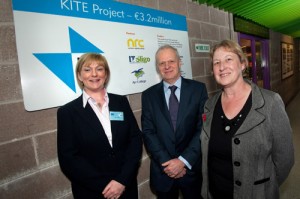IT Sligo, in partnership with Northern Regional College (NRC) and Ayr College, has) launched a €3.2million KITE (Knowledge and Innovation Transfer in Engineering) project, funded by the EU’s INTERREG IVA Programme, at the NRC Farm Lodge Campus in Ballymena.
The three year project aims to secure the long term sustainability of the key engineering and manufacturing sectors within Northern Ireland, the Border Region of Ireland and Western Scotland, by increasing productivity and reducing costs for employers.
Speaking at the launch, Professor Terri Scott, IT Sligo President said: “The collaboration of IT Sligo, NRC and Ayr College under KITE will make a significant contribution in the success of engineering and manufacturing industries in each of our regions, creating a ‘virtual centre of excellence’ and enabling businesses to improve their competitiveness and up skill their staff, with minimal interruption and cost.”
Each college is equipped with machinery to facilitate training in areas including robotics, computer numerical control, mechatronics and electronics, while Ayr College also provides new expertise in the aerospace and composite materials sectors with IT Sligo specialising in on-line technologies for Engineering. This enables businesses to train employees on expert equipment without interrupting production at their site and therefore reducing costs.
Tánaiste and Minister for Education and Skills, Mary Coughlan TD, complimented the colleges on their collaboration; “The KITE project represents a constructive meeting of minds and resources across three regions in the best interests of each of their local economies. I am impressed with the initiative and the potential is has for industry. It is this kind of innovative approach that will help us maintain our competitiveness in the global economy.”
KITE Project Co-ordinator at IT Sligo Stephen Reid said that the advantage given to students as a result of the move, is significant; “This methodology developed in this project allows students to study courses like CAD and mechatronics completely online. They can do it in their own time, while holding down a job, and they can practice at any time that suits them. The ‘virtual classroom’ also provides them with important interaction with their lecturer and classmates.
“They are learning new skills that they can directly apply in the workplace, and the fact that they can do the course without having to travel to the college cuts down on travel costs and loss of productivity in the workplace.”
Head of Department of Mechanical and Electronic Engineering at IT Sligo, Frank Carter said; “This ‘innovation through education’ has enormous potential for industry because it facilitates up-skilling on-the-job, leading to increased productivity and competitiveness.
“There simply are no barriers to this type of learning that allows practical, physical work to be conducted entirely through the internet. We already have many students who are based overseas studying through IT Sligo and there is huge potential for the growth of online learning at IT Sligo in the overseas market as a result of this project.”
Tracey Scullion, Programme Manager at the Special EU Programmes Body, said: “This highly innovative project, which has been supported by the EU’s INTERREG IVA Programme, will increase the long-term competitiveness of engineering and manufacturing companies on a cross-border basis. By improving private sector access to training in state-of-the-art robotics and automotive technology helping to ensure the long-term viability and sustainability of this highly important business sector.”
A project steering group has also been set up to monitor the implementation of the KITE project. The group will help make key decisions on training and delivering policy, and will work with the local advisory group in each region.

Professor Terri Scott, President IT Sligo; Trevor Neilands, Director Northern Regional College; and Patricia Wallace, Director of Business Development, Ayr College at the official launch of KITE at the Northern Regional College.